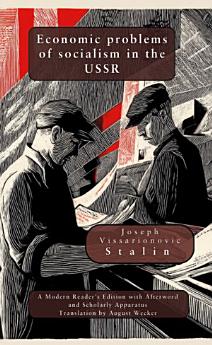Economic problems of Socialism in the USSR
About this ebook
Published in Moscow by the state press in February 1952, this lengthy treatise covers topics like the character of socialist economic laws, commodity exchange under socialism, elimination of urban-rural divides, and the inevitability of imperialist wars (a separate chapter). The contents list in its English translations shows sections on the law of value, the world market’s crisis, and so on. For example, Stalin writes that because socialism still involves goods and services exchanged, one must use trained managers and enforce discipline in production. He warns against simplistic interpretations that Marx’s value law only applied to capitalism; instead he insists it “still operates” under socialism but as a temporary vestige. Overall, the work serves as a manual for Soviet economists, setting orthodoxy on these issues.
Politically, Economic Problems was significant for codifying Stalin’s economic doctrine as official Soviet orthodoxy. It was translated and distributed widely in the Eastern Bloc and China, becoming a foundational text on socialist economy there. Historians note it aimed to resolve debates of the late 1940s (such as those sparked by economist Eugene Varga). The claim that socialist society still obeyed objective economic laws underlined a pragmatic approach to central planning. Although it was written late in Stalin’s life, its influence persisted: later communist leaders would cite or challenge its theses (e.g. Mao critiqued some points). In historical retrospect it is viewed as Stalin’s attempt to fuse Leninist economics with his own interpretations, closing an era of Bolshevik theory. As one of Stalin’s last major publications, it also marks the endpoint of his intellectual legacy before his death in 1953.
This modern Critical Reader’s Edition includes an illuminating afterword tracing Stalin's intellectual relationships with revolutionary philosophers and politicians (including Hegel, Feuerbach, Engels, and Ricardo), containing unique research into his intellectual development and economic-metaphysical theories, religious impulses masquerading as materialism, a comprehensive timeline of his life and works, a glossary of Lenin-Stalinist terminology, and a detailed index of his work works. Combined with the scholarly amplifying material, this professional translation is an indispensable exploration of Stalin’s world-changing philosophy which he manifested into one of the most terrifying authoritarian regimes ever created.






